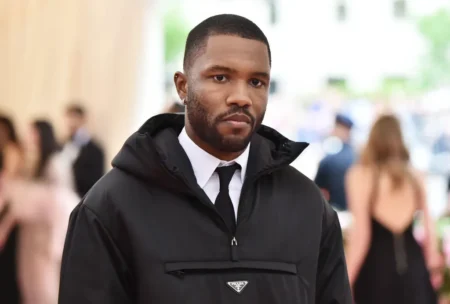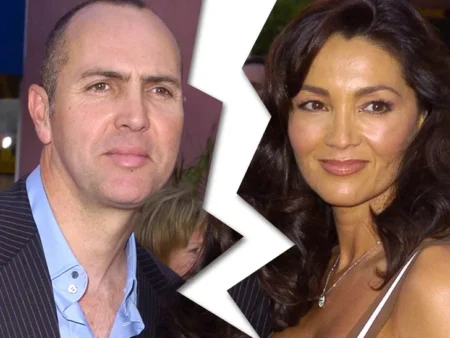Michael Moorer Remembers a Legend Lost
Michael Moorer, one of the few warriors to trade blows with George Foreman in the ring, is reeling from the boxing icon’s death. TMZ Sports sat down with the former heavyweight champ on Monday, March 24, 2025—just three days after Foreman’s family announced his passing at 76—and the grief was palpable. “I’m heartbroken,” Moorer, 57, told us, his voice heavy as he reflected on the loss of a man he calls “a gentle giant” and “a great person.” Foreman, a two-time heavyweight king and Olympic gold medalist, left an indelible mark on the sport—and on Moorer, who says the pugilist’s absence will echo far beyond the ropes.
The news hit Moorer like a sucker punch. “It was shocking,” he said, recalling how he first heard of Foreman’s death on Friday, March 21. “I didn’t believe it was true at first—it was devastating.” Foreman’s family confirmed he “passed away peacefully” at his Houston home, surrounded by loved ones, though a cause remains undisclosed. For Moorer, the sting is personal: he faced Foreman in a legendary 1994 bout, lost to his thunderous right hand, and yet forged a bond that lasted decades. “He was more than a fighter,” Moorer said. “He was a friend.”
The Night of the Knockout: November 5, 1994
Their clash is etched in boxing lore. On November 5, 1994, at Las Vegas’s MGM Grand, Moorer—then 26 and undefeated at 35-0—defended his WBA and IBF heavyweight titles against Foreman, a 45-year-old comeback king. Billed “One for the Ages,” it pitted youth against experience, with Moorer a 3-1 favorite. For nine rounds, he dominated, peppering Foreman with jabs and piling up points. “I had him,” Moorer told Sports Illustrated in 1995. But in the 10th, Foreman unleashed a right hand that stunned the world—and Moorer—dropping him flat for a knockout at 2:03.
The punch was seismic. Foreman, at 45 years and 299 days, became the oldest heavyweight champ in history, reclaiming a title he’d lost to Muhammad Ali 20 years prior in the “Rumble in the Jungle.” Moorer, dazed and bloodied, needed 32 stitches to mend a lip split wide open. “It felt like a sledgehammer,” he told TMZ Sports, wincing at the memory. Yet, no bitterness lingered. “That’s boxing,” he shrugged. “George earned it.” The fight, aired on HBO with 1.4 million PPV buys (Boxing News), remains a testament to Foreman’s grit—and a career-defining moment for both men.
From Rivals to Telephone Pals
What could’ve been a grudge became a friendship. “We stayed in touch,” Moorer said, smiling faintly. “We’d talk on the phone—about life, boxing, everything.” Foreman’s warmth disarmed him. Known for his post-ring reinvention—grilling empire, preacher, philanthropist—the “Big George” Moorer knew was a far cry from the snarling beast of the ‘70s. “He was a gentle giant,” Moorer said, echoing tributes from Ali (“a teddy bear”) and Evander Holyfield (“a big heart”). Their bond deepened over time, a quiet respect forged in that Vegas ring.
Their last meeting came in April 2023 at a Houston screening of Big George Foreman, the biopic starring Khris Davis as Foreman and John Magaro as Moorer. “It was great to see him,” Moorer recalled. “My son got a picture with him—he was thrilled.” That photo, snapped with Foreman flashing his gap-toothed grin, is now a treasure. “George loved kids,” Moorer said. “He’d talk to anybody.” The film, grossing $6 million (Box Office Mojo), captured Foreman’s improbable comeback—capped by that Moorer KO—reminding fans why he’s a legend.
Foreman’s Towering Legacy
Foreman’s death closes a chapter on boxing’s golden age. Born January 10, 1949, in Marshall, Texas, he rose from poverty to Olympic gold in 1968, then claimed the heavyweight crown in 1973 by flattening Joe Frazier in two rounds. His 1974 loss to Ali in Zaire was a setback, but his 1987 comeback—after a decade as a preacher—stunned the sport. By 1994, with Moorer’s belt in hand, he’d defied Father Time. “He showed age is just a number,” Moorer said. Foreman retired in 1997 at 48, with a 76-5 record, 68 KOs, and a net worth topping $300 million from his George Foreman Grill (Forbes, 2020).
Tributes poured in post-March 21. “A true warrior,” Holyfield posted on X. “The greatest,” Mike Tyson wrote. Moorer’s take? “He’ll be missed—by me, by boxing, by everyone.” On X, #RIPGeorgeForeman trended, with @BoxingTalk1 posting, “Moorer vs. Foreman ‘94—still gives me chills,” and @SportsFanatic88 adding, “A giant in and out of the ring.” The outpouring reflects Foreman’s reach—12 kids, a church, a grill empire that sold 100 million units (NPR, 2019)—a life as big as his fists.
Moorer’s Own Path: A Fighter’s Reflection
Moorer’s no stranger to the spotlight either. Born November 12, 1967, in Brooklyn, he snagged the WBO light heavyweight title in 1988, then moved up to heavyweight, winning the WBA/IBF belts in 1992 against Holyfield. Post-Foreman, he reclaimed the IBF title in 1996, retiring in 2008 with a 52-4-1 record, 40 KOs. Now a trainer in Florida, he’s shaping the next generation—yet Foreman’s shadow looms. “He taught me resilience,” Moorer said. “That night in ‘94, he took my belt, but he gave me something too.”
The boxing world’s reeling—Foreman’s death follows Muhammad Ali’s in 2016 and Joe Frazier’s in 2011, thinning the ranks of a storied era. “It’s a sad week,” Moorer sighed. Share this tearful tribute with every fight fan you know—because when Moorer mourns Foreman, it’s a requiem for a giant whose punches, and heart, won’t be forgotten. RIP, Big George.








